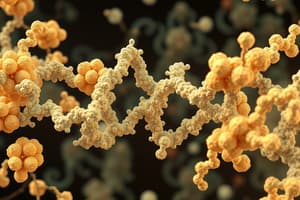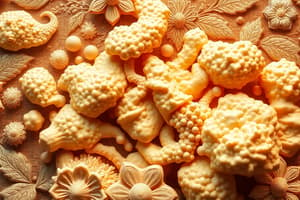Podcast
Questions and Answers
What is the function of enzymes?
What is the function of enzymes?
- Provide vital nutrients to tissues
- Catalyze chemical reactions (correct)
- Regulate metabolism
- Carry vital gases to tissues
What do structural proteins provide?
What do structural proteins provide?
Structure or support to tissue
What is the primary function of gas transport proteins?
What is the primary function of gas transport proteins?
Carry vital gases to tissues
What is the role of antibodies in the body?
What is the role of antibodies in the body?
What do hormones regulate?
What do hormones regulate?
What do mechanical proteins do?
What do mechanical proteins do?
What is the function of nutrients in the body?
What is the function of nutrients in the body?
Flashcards are hidden until you start studying
Study Notes
Types of Proteins and Their Functions
-
Enzymes: Catalysts that accelerate chemical reactions in biological systems. Example: Lactase breaks down lactose found in milk products.
-
Structural Proteins: Provide support and structure to tissues. Examples include keratin, which is found in hair, and collagen, which is a key component of bones.
-
Gas Transport Proteins: Essential for transporting gases within the body. Hemoglobin is a prime example, responsible for carrying oxygen to tissues.
-
Antibodies: Integral to the immune system, these proteins identify and neutralize foreign invaders. For instance, Anti-A and Anti-B antibodies play a role in the ABO blood system.
-
Hormones: Serve as chemical messengers that regulate various physiological processes, including metabolism. Insulin is a critical hormone that controls the metabolism of carbohydrates and fats.
-
Mechanical Proteins: Facilitate movement and functions in muscles. Key proteins include actin and myosin, which are instrumental in muscle contraction.
-
Nutrients: Supply essential nutrients necessary for tissue function and health. Ovalbumin, the main protein in egg whites, is an example of a nutrient-providing protein.
Studying That Suits You
Use AI to generate personalized quizzes and flashcards to suit your learning preferences.




